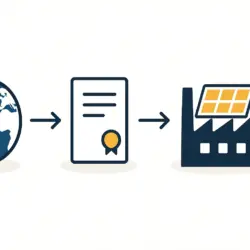What is the significance of the Honiara solar plant in the Solomon Islands?
The Honiara Solar Plant marks a major step towards energy independence for the Solomon Islands. As the nation’s first utility-scale solar power facility, it signifies a pivotal shift away from a near-total reliance on imported fossil fuels and aligns the country with the global transition toward renewable energy.
A Game-Changer for Solomon Islands: The Honiara solar plant
Replacing imported diesel with solar energy addresses both pressing economic and environmental concerns. The Solomon Islands, like many Pacific nations, has long struggled with the high and volatile cost of importing diesel for electricity generation. The Honiara Solar Plant helps to alleviate this financial burden by harnessing a local, abundant, and renewable energy source, thereby stabilizing energy costs for consumers and businesses.
This shift is crucial as the Solomon Islands faces increasing energy demands fueled by population growth and economic development. By integrating solar power, the nation diversifies its energy mix, moving towards a more stable and sustainable supply for the future.
Community and Economic Benefits of the Honiara solar plant
Beyond environmental gains, the Honiara Solar Plant is set to boost the local economy. The project creates jobs not only in the initial construction and ongoing plant operation but also opens doors to new sectors. The development has encouraged vital skills training, preparing local workers for future opportunities in the renewable energy industry. Understanding the basics of manufacturing and the broader manufacturing process could pave the way for greater local involvement in the solar supply chain.
The plant’s success could also attract further investment in renewable energy projects across the Solomon Islands. A clear understanding of the plant cost breakdown for such facilities is essential for future planning and securing funding, which will further enhance the country’s energy infrastructure and strengthen its economy.
Energy Security and Resilience with the Honiara solar plant
By reducing dependence on imported fuels, the Honiara Solar Plant significantly enhances the Solomon Islands’ energy security. This is a strategic priority for a nation vulnerable to global fuel price fluctuations and supply chain disruptions. As detailed in this Solomon Islands Solar Plant: A Financial Modeling Guide, local energy production is a cornerstone of national independence. Over time, this could even extend to exploring the sourcing of raw materials required for renewable technologies.
The solar plant also contributes to the country’s resilience against climate change. As a low-lying island nation, the Solomon Islands faces significant risks from rising sea levels and extreme weather events. This transition to clean energy is a proactive and vital step in mitigating these climate risks and reducing the country’s carbon footprint.
A Model for the Region: The Honiara solar plant
The Honiara Solar Plant serves as a powerful model for other Pacific island nations seeking to transition to renewable energy. It showcases the immense potential of solar power in addressing energy challenges common to the region, such as high transportation costs for fuel and vulnerability to climate impacts.
The successful implementation of this project could inspire similar initiatives in neighboring countries, fostering a regional shift towards sustainable, independent, and resilient energy solutions.
Partnerships and Innovation driving the Honiara solar plant
The Honiara Solar Plant is a testament to the power of effective partnerships and technological innovation. The project brought together local and international stakeholders, combining financial resources and technical expertise to achieve a common goal. This included leveraging advanced manufacturing machines and processes to build a state-of-the-art facility.
This collaborative approach not only ensured the project’s success but also established a strong precedent for future renewable energy initiatives in the Solomon Islands and the wider Pacific region.
If you’re inspired by this project and want to learn more about the intricacies of solar energy production, consider exploring our free e-course to deepen your understanding.



